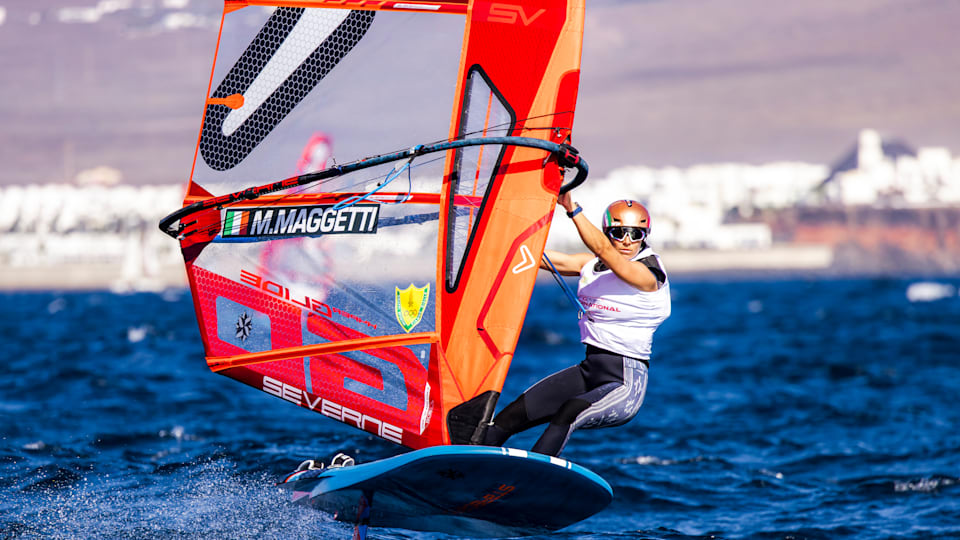Paris 2024: What is iQFOiL, the new Olympic sailing board replacing RS:X?

iQFOiL will replace RS:X as the windsurfing class at Olympic Games Paris 2024. What is this board? What is a foil? Who are the athletes to watch? Olympics.com answers all of your questions.
At Olympic Games Paris 2024, new events such as breaking will feature while some sports will have revised formats and disciplines. To be unbeatable on what to expect at the next Games, Olympics.com delivers everything you need to know about what’s new at Paris 2024.
Today, we talk about iQFOiL the new windsurfing board that will be used at Marseille Marina, the Olympic venue for sailing at Paris 2024.
What is iQFOiL at Paris 2024?
iQFOiL is a format of windsurfing where the main difference with the old Olympic format, RS:X, is that the daggerboard is replaced by a foil. So, instead of floating, the board appears to fly thanks to the use of hydrofoils attached to the bottom of the board that lift the board completely out of the water at planing speeds.
Thanks to this technology, not only does the sport look even more spectacular but athletes go faster.
What was the old Olympic board, RS:X?
Since Beijing 2008 and until Tokyo 2020, the format for windsurfing events at the Olympics was RS:X. The board featured a traditional daggerboard, or keel, which balances the board, and uses the same type of sail as the iQFOiL.
Two athletes who have mastered this format are Netherlands' Dorian van Rijsselberghe who has won two Olympic titles, in London 2012 and Rio 2016, while Charline Picon from France won gold in Rio 2016 and silver in Tokyo 2020.
What are the main differences between iQFOiL and RS:X, the old Olympic board?
The main difference between the new and old Olympic board is that iQFOiL goes a lot quicker than RSX, performs better in lighter winds as the board is above the water thanks to the hydrofoil, no board resistance to the water enables a racer to take a more direct route to a mark.
Foiling is also silent and smooth so is not so physically pounding on the body, but a higher level of focus on balancing the board/hydrofoil is needed to achieve the maximum speeds.
On race start, iQFOiL immediately reaches a racing speed of 25km/h whereas RS:X starts at around 5/kmh.
The board is wider and shorter on the iQFOiL, which makes it compact and agile.
As opposed to RS:X, iQ doesn't have a dagger board.
Athletes to watch in iQFOiL at Paris 2024
Many athletes from RS:X are switching to the new Olympic class and as per past windsurfing events at the Games, Netherlands is still a powerhouse in iQFOiL, especially in the men’s event.
Luuc van Opzeeland won bronze at the 2021 World Championship, the first edition in this class, and silver in 2022. Compatriot Huig-Jan Tak claimed bronze in 2022, and they will both be medal contenders at Paris 2024. Teammate Kiran Badloe, who in 2020 was the first-ever European champion in the discipline before becoming Olympic champion in RS:X a year later, will also be vying for Olympic honours.
Nicolas Goyard from France, the brother of Thomas Goyard, a silver medallist in RS:X at Tokyo 2020, won the World Championships in 2021, the same year he became European champion for the first time. He also bagged the title in 2022. Sebastian Kördel from Germany, who won the Worlds in 2022, will also be in the mix.
In the women’s event, French sailor Helene Noesmoen who was world champion in 2021, is one to watch. The 29-year-old has also achieved the European triple with titles in 2020, 2021 and 2022. She didn’t manage to continue this success at the 2022 World Championships, where Italian Marta Maggetti won gold ahead of Daniela Peleg and Maya Morris, both from Israel.
Islay Watson from Great Britain has won two consecutive silver medals at the European Championships in 2020 and 2021, with compatriot Emma Wilson, a bronze medallist from Tokyo 2020 in RS:X, doing the same in 2022. Dutch athlete Lilian de Geus, a world champion in RS:X in 2019, took bronze the year after at the 2020 European Championships in iQFOiL.
iQFOiL: Number and statistics on size and speed
- Size of an iQFOiL board: 220x95cm
- Size of an iQFOiL sail: men 9m2 for men, 8m2 for women
- Average speed of iQFOiL: Around 42 km/h (upwind 33km/h, downwind 54km/h)
- Max speed of iQFOiL: Around 63km/h
As a comparison, below are the numbers for RS:X
- Size of an RS:X board: 286x93cm
- Size of an RS:X sail: men 9.5m2 for men, 8.5m2 for women
- Average speed of RS:X: Around 10km/h
- Max speed of RS:X: Around 55/60km/h
How to qualify for iQFOiL at Paris 2024?
The 2023 Sailing World Championships will be the first Olympic qualifier for iQFOiL at Paris 2024. It will be held in The Hague, Netherlands, from 10-20 August 2023.
The 2023/2024 Continental qualification events (date TBC) will be the next Qualifying chances before the 2024 Last Chance Regatta, from 18 to 27 April 2024 in Hyeres, France.
Get to know the full Qualification pathway for sailing at Paris 2024
Schedule of iQFOiL at Paris 2024
Sunday 28 July
- 11:00-19:00: Men's Windsurfing - Opening Series
- 11:00-19:00: Women’s Windsurfing - Opening Series
Monday 29 July
- 11:00-19:00: Men's Windsurfing - Opening Series
- 11:00-19:00: Women’s Windsurfing - Opening Series
Tuesday 30 July
- 11:00-19:00: Men's Windsurfing - Opening Series
- 11:00-19:00: Women’s Windsurfing - Opening Series
Thursday 1 August
- 11:00-19:00: Men's Windsurfing - Opening Series
- 11:00-19:00: Women’s Windsurfing - Opening Series
Friday 2 August
- 11:00-19:00: Men's Windsurfing - Medal Series
- 11:00-19:00: Women's Windsurfing - Medal Series